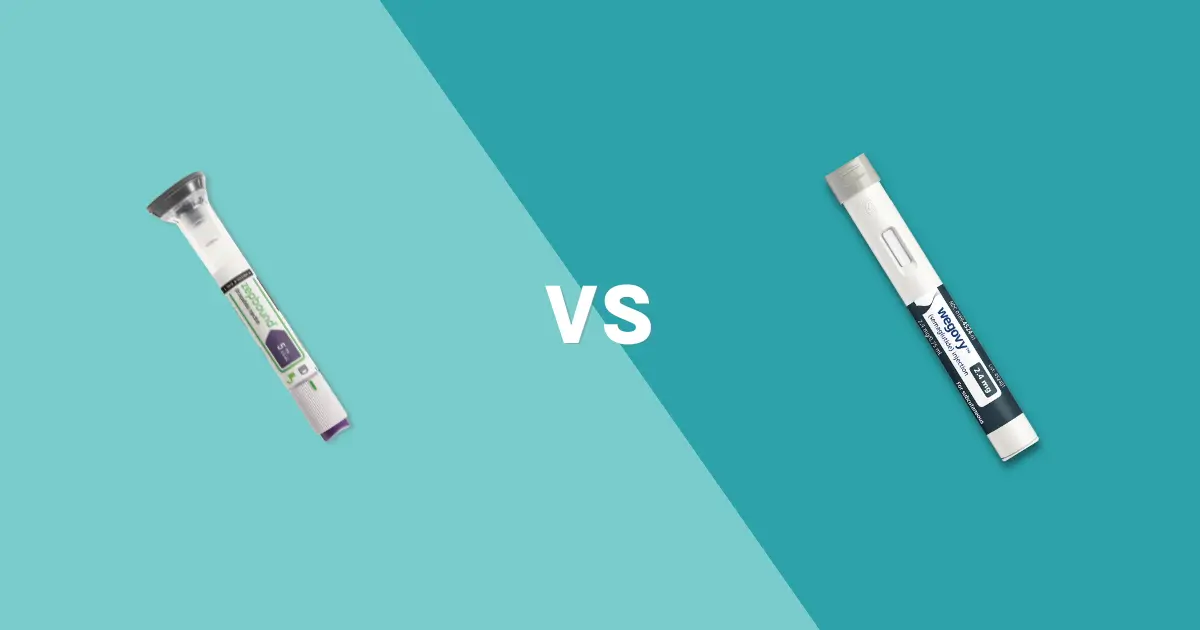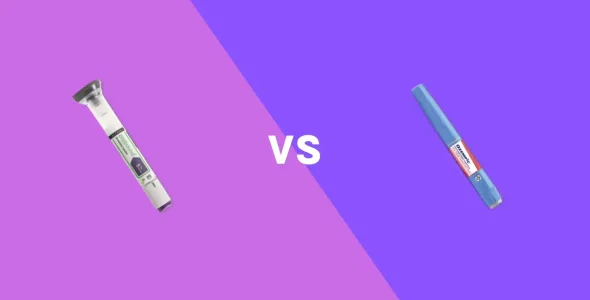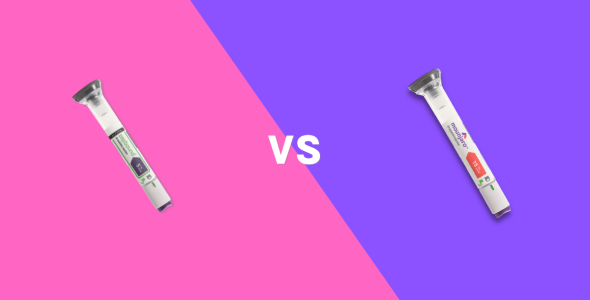Zepbound vs. Wegovy for weight loss: what’s the difference?
Key highlights
- Zepbound (tirzepatide) and Wegovy (semaglutide) are both once-weekly injectable prescription medications indicated for chronic weight management, offering similar benefits, but they have distinct differences that should be carefully considered when choosing the right medication for you.
- Zepbound may lead to greater weight loss compared to Wegovy, but Wegovy might be a preferable option for adolescent patients and individuals with cardiovascular conditions.
- You may be able to save and reduce your out-of-pocket costs on Zepbound and Wegovy by enrolling in the manufacturer's savings programs, depending on your eligibility.
Zepbound (tirzepatide) and Wegovy (semaglutide) are innovative weight loss medications that are injected once-weekly.
Zepbound and Wegovy are similar in many ways and have a few differences. Both medications are injected once weekly and may cause similar side effects such as nausea.
While Zepbound has been reported to result in greater weight loss than Wegovy, there are some differences between these two medications that can make one better than the other, depending on your circumstances.
What are Zepbound and Wegovy?
Zepbound and Wegovy are both FDA-approved medications designed for weight loss, but they differ in a few key areas.
Wegovy, which contains semaglutide as its active ingredient, was approved in 2021. Zepbound, with tirzepatide as its active component, received its approval in 2023.
While these brand name medications share similarities, such as their purpose, side effects, and once-weekly injection administration method, they also have differences that may affect which one is better suited to your individual needs and preferences.
What are the main differences between Zepbound and Wegovy?
1. Wegovy is approved for children as young as twelve while Zepbound is not.
Wegovy is currently approved for use in patients as young as 12 years old who have a BMI at or above the 95th percentile for their age and sex.
In contrast, Zepbound is restricted to adult use and lacks studies supporting its safety and efficacy in adolescents. Zepbound is currently being studied for use in adolescents but is currently only approved for adults.
Saxenda is another weight loss medication that is FDA-approved for use in adolescents.
2. Zepbound works more effectively to target weight loss compared to Wegovy.
Zepbound (tirzepatide) and Wegovy (semaglutide) are weight loss medications that work by mimicking hormones that regulate appetite, thereby influencing eating behaviors. Both medications are effective for weight management.
Zepbound is unique in that it acts as an agonist for both glucagon-like peptide-1 (GLP-1 receptor agonists) and glucose-dependent insulinotropic polypeptide (GIP), while Wegovy specifically targets only the GLP-1 receptor. By activating the GLP-1 receptor, both drugs can lower blood sugar levels and improve the amount of weight loss.
The dual action of Zepbound on two hormone pathways may offer an additive effect, potentially leading to more significant weight loss.
3. Wegovy is beneficial for patients with cardiovascular diseases.
Wegovy has recently received FDA approval in 2024 for reducing the risk of major cardiovascular events, such as heart attack and stroke, in obese or overweight patients with heart disease. This marks a significant milestone, as it is the first weight-loss medication approved specifically for the prevention of these life-threatening cardiovascular events, reducing the risk by about 20% compared to a placebo.
In contrast, Zepbound has not yet received approval for this indication, as current studies have not sufficiently demonstrated its efficacy and safety in this context. Zepbound is currently being studied for potential cardiovascular benefits.
4. Zepbound and Wegovy are dosed differently.
Both Zepbound and Wegovy are administered as a once-weekly subcutaneous injection. The dosing regimen for each medication begins with the lowest dose, gradually increasing every four weeks. However, they differ in the number of available strengths:
Zepbound offers six different once-weekly doses, while Wegovy provides five once-weekly doses. As a result, patients can reach their maintenance dose more quickly with Wegovy compared to Zepbound.
Wegovy has a starting once-weekly dosage of 0.25 mg for 4 weeks, and the dosage is increased every 4 weeks to 0.5 mg, 1 mg, and 1.75mg. If the higher dosages are tolerated by the patient, the dose is increased to 2.4 mg weekly, which is the recommended maintenance dose.
Zepbound has a started once-weekly dosage of 2.5mg for 4 weeks, and the dosage is increased to 5mg once-weekly. If tolerated by the patient, the dosage can be increased every 4 weeks to 10 mg or 15 mg weekly.
5. Zepbound might provide greater weight loss compared to Wegovy.
Although no clinical trials comparing the weight loss effects of Zepbound and Wegovy are available at the time of writing this article (a new comparison trial is expected to be completed by the end to late 2024), data from individual trials of each medication suggest that Zepbound leads to a higher percentage of body weight loss than Wegovy. This conclusion is based on separate studies, thus proving the potential differences in effectiveness between the two treatments.
Zepbound vs Wegovy dosage
Zepbound and Wegovy are both injectable medications designed for weekly use, with a gradual dose escalation recommended to reduce the risk of gastric side effects. While they share similarities, they differ in both the dosage strengths available on the market and the specific dosages required for patients.
Zepbound dosing
The available once-weekly doses of Zepbound include 2.5 mg, 5 mg, 7.5 mg, 10 mg, 12.5 mg, and 15 mg. Treatment typically begins with the lowest dose, gradually increasing each month to the next higher dose. This titration continues until patients achieve a maintenance dose, which may range from 10 mg to 15 mg, depending on individual response and tolerance.
Wegovy dosing
Wegovy is available in once-weekly doses of 0.25 mg, 0.5 mg, 1 mg, 1.7 mg, and 2.4 mg. Patients start on the lowest dose, with the dosage being increased every four weeks. This process continues until they reach a maintenance dose of either 1.7 mg or 2.4 mg, depending on how well they tolerate the medication.
Zepbound vs Wegovy side effects
Both Zepbound and Wegovy can cause gastrointestinal side effects, such as nausea, diarrhea, and vomiting, which are the most common side effects. To minimize these, the dosage is gradually increased over several weeks. Although there are some side effects unique to each medication, they are relatively uncommon. It’s important to be aware of these possible side effects and ask for medical advice from your healthcare provider if you experience any concerning symptoms.
Zepbound side effects
Zepbound can cause side effects such as constipation, belching, indigestion, fatigue, and low blood sugar. Additionally, there have been reports of possible hair loss in some patients.
Wegovy side effects
Wegovy may also cause side effects such as constipation, fatigue, and indigestion. Furthermore, it can even lead to low blood sugar levels, and more uniquely, it may cause dizziness and headaches in some patients.
Zepbound vs Wegovy for weight loss
Zepbound and Wegovy are FDA-approved medications for chronic weight management in patients who are either obese, with a body mass index (BMI) of 30 or higher, or overweight, with a BMI of 27 or higher, and have at least one weight-related health condition, such as high blood pressure, high cholesterol, or type 2 diabetes.
Which is better for weight loss, Zepbound or semaglutide?
Zepbound (tirzepatide) and Wegovy (semaglutide) are both effective weight loss drugs, as demonstrated by numerous studies.
One study comparing the side effects of these medications found that while both had similar side effects, patients on Zepbound (tirzepatide) experienced greater weight loss compared to those on Wegovy (semaglutide).
Your doctor can assist you in choosing the most suitable medication by considering factors such as availability, your overall health status, and your weight loss goals.
Are there any clinical studies comparing the efficacy of Zepbound and Wegovy for weight loss?
Ongoing clinical studies are comparing the effectiveness of Zepbound and Wegovy for weight loss. Preliminary findings indicate that Zepbound has led to greater weight loss in patients compared to Wegovy, consistent with earlier reports. These studies aim to provide more detailed insights into the differences and potential advantages of each medication.
Zepbound clinical trials
In a clinical trial involving 2,519 patients, Zepbound was tested at varying doses of 5 mg, 10 mg, and 15 mg over a 72-week period, with an additional 958 patients receiving a placebo. The results were compelling: patients on Zepbound lost 15%, 19.5%, and 20.9% of their body weight at the respective doses, compared to just a 3.1% weight loss in those who received the placebo. These findings underscore the significant weight loss potential of Zepbound.
Wegovy clinical trials
Patients who were given Wegovy in a clinical trial over a 68-week period reported an average weight loss of 14.9% of their body weight, in contrast to a 2.4% loss in those receiving a placebo. Similarly, in a study involving children aged 12 and older, those taking Wegovy experienced a 16.1% decrease in body weight, while the placebo group saw a small weight gain of 0.6%. These outcomes prove Wegovy’s effectiveness in achieving weight loss across different age groups.
A 7.2 mg once-weekly Wegovy dosage is currently being studied in a phase 3 trial. The 7.2 mg dosage is 3 times higher than the current highest-available Wegovy dose of 2.4 mg weekly. This dose may result in significantly greater weight loss than the 2.4 mg weekly dose.
How much weight can you lose on Zepbound?
Clinical trials have shown that patients on a maintenance dose of Zepbound experienced significant weight loss, with an average of 18% of their body weight compared to those who received a placebo. This highlights Zepbound’s effectiveness as part of a comprehensive weight management plan.
How much weight can you lose on Wegovy?
In four 68-week clinical trials, patients treated with Wegovy reported an average weight loss of 12.8% of their body weight. This makes Wegovy a valuable option for long-term weight management in both adolescents and adults with specific health conditions.
Benefits for other health conditions
Zepbound and Wegovy are currently being studied for additional uses to treat health conditions other than weight loss and cardiovascular risk reduction.
Wegovy has demonstrated positive results for certain patients with heart failure and a recent study found potential kidney-related benefits for patients with heart disease. Wegovy is also being studied for metabolic dysfunction-associated steatohepatitis, or MASH (non-alcoholic steatohepatitis), a health condition caused by excess fat buildup in the liver.
Zepbound has also shown benefits for patients who have moderate-to-severe obstructive sleep apnea and could be approved by the FDA for the treatment of this condition by the end of 2024. It’s also currently being studied in certain patients with heart failure, MASH, and chronic kidney disease.
Other differences between Zepbound and Wegovy
Some studies suggest that patients on Zepbound may experience greater weight loss compared to those on Wegovy. This difference is attributed to Zepbound’s dual-action mechanism, which targets two pathways in the body to regulate appetite, whereas Wegovy targets only one. This broader approach may lead to more significant weight reduction for some patients.
How to save money on Zepbound and Wegovy
You can visit Eli Lilly’s website to check your eligibility and enroll for a Zepbound Savings Card, which can significantly reduce your out-of-pocket costs. If your insurance covers Zepbound, you may pay as little as $25 for a one-month or three-month supply. However, if Zepbound is not covered by your insurance, the cost may be around $550 per month.
For Wegovy, Novo Nordisk offers a copay card that may allow eligible patients to pay $0 for their medication. To determine eligibility and whether Wegovy is covered by your insurance, you can start by visiting Novo Nordisk’s website and answering a few questions to get started. It’s important to verify coverage details with your specific insurance plan to understand your potential costs.
Can you use Zepbound and Wegovy together?
No, you will not be prescribed both medications simultaneously, as it is not recommended to take them together. If you feel your current medication isn’t providing sufficient results, discuss alternative options with your doctor rather than using both medications concurrently.
Switching from Wegovy to Zepbound
If you’re considering switching from Wegovy to Zepbound, it’s important to consult your healthcare provider for guidance. They will typically initiate treatment at a lower dose, gradually adjusting it until the suitable Zepbound dose for you is reached.
Bottom line
Wegovy and Zepbound are both FDA-approved weight loss medications that work in similar ways, but they have significant differences that should be carefully evaluated by your healthcare provider. Factors such as your age, overall health, and specific weight loss goals will play a crucial role in determining which medication is most suitable for you.
Studies have shown that Zepbound may lead to more significant weight loss compared to Wegovy, but Wegovy might be a better option for adolescent patients with cardiovascular conditions.

















